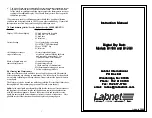
Chapter 4
EDGE Call Mode Operation
EGPRS basics
174
4460 GSM System Option and 4468 EDGE System Option
Version 12.20
The new modulation requires a completely new transmitter design. Due to the
fact that the envelope is no longer constant and therefore the amplitude is
changing for EDGE, the power amplifiers used are different. For this reason a
common approach for RF designers is to split the transmit path into a path for
GMSK transmission and one for 8-PSK transmission. The 8-PSK modulator and
amplifier should be tested and in some cases should be aligned separately to
ensure that they work to specifications.
The physical receive path can remain the same for GMSK and 8-PSK. There is no
need for having a second receive path. This means that the existing receiver tests
for GMSK (GSM or GSM/GPRS) are sufficient and do not need to be extended.
Required tests
As explained above, only the transmitter needs testing and alignment. The tests
can be divided into power and modulation quality tests.
Power measurements
One important quality factor with all RF systems is transmit power. The
maximum power level is key to a good data transfer rate in rural areas with a
large cell radius. As the transmitter is in a different operating mode when
applying 8-PSK modulation, measurements are essential to ensure that the
power level lies within the allowable limits. Note that the cell radius can be lower
with 8-PSK modulation than with GMSK due to the increased number of
symbols.
To minimize unnecessary interference with adjacent cells and to ensure proper
handover between cells, the power control mechanism in GSM and GPRS uses
further power steps with exact levels. In manufacturing and after repair, these
levels are usually calibrated with the help of a test set, with correction values
being stored in the mobile phone.
In measurements of power versus time, the same principles as in GMSK are
applied to 8-PSK, but with a modified template; the template takes into account
that the 8-PSK signal amplitude varies between symbols, depending on the exact
symbol sequence. This attribute of 8-PSK makes it more difficult to use cheap,
nonlinear amplifiers and may lead to hardware and/or software designs
correcting these nonlinearities. The power/time template for 8-PSK signals is
shown below; the flat part at the beginning and the end of the burst applies to
the tail bits, which have been chosen such that only minimal variations of the
power level occur. The limits of the power level steps are identical to those
known from GMSK modulation.
MCS-5
8-PSK
22.4 kbps
MCS-6
8-PSK
29.6 kbps
MCS-7
8-PSK
44.8 kbps
MCS-8
8-PSK
54.4 kbps
MCS-9
8-PSK
59.2 kbps
Table 1
Modulation and Coding Schemes
MSC
Modulation
Data rate
















































